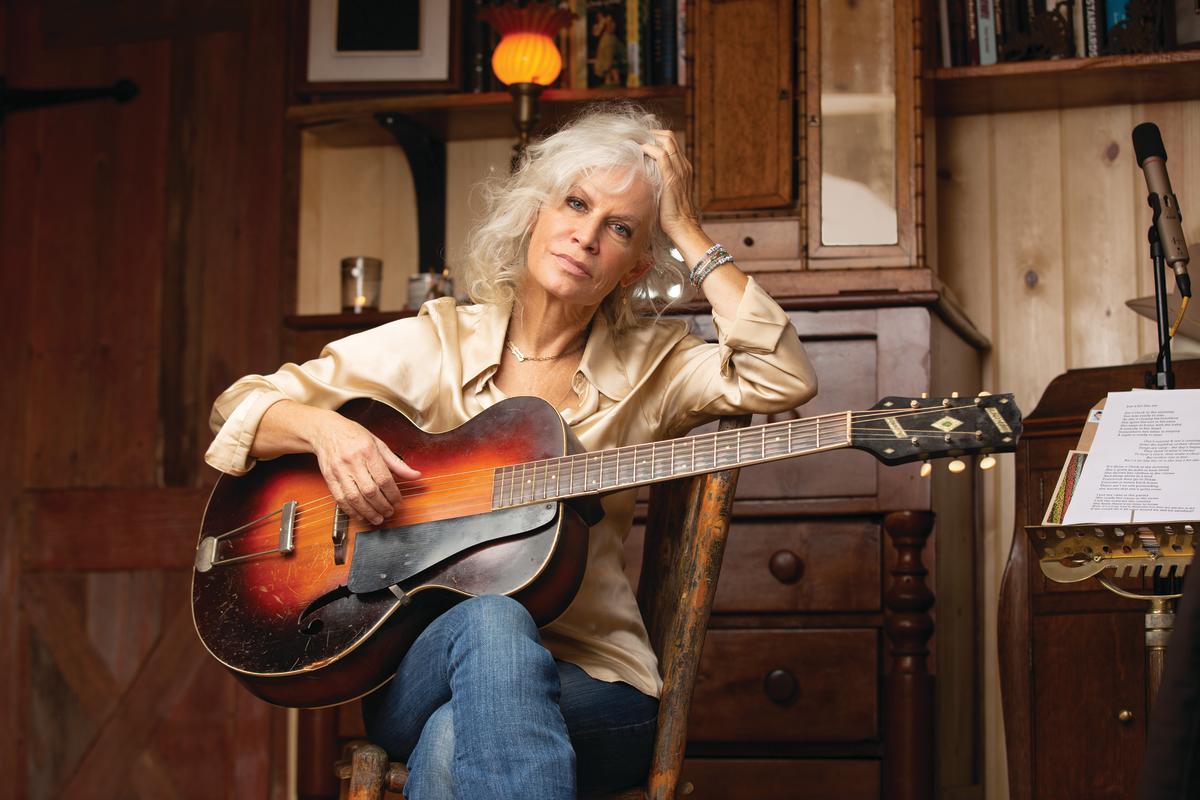
Photography by Aaron Patton
It’s as if a favorite landscape painting has come to life.
Winding roads, a canopy of trees, peaceful waters and—come spring—thousands and thousands of tulips as far as the eye can see. But Bartlett Arboretum, 15 acres of natural paradise just south of Wichita in Belle Plaine, is real—even if it is entirely unexpected. Just ask Robin Macy, the current steward who almost didn’t believe her eyes when she stumbled upon it entirely by chance.
In the mid-1990s, Macy was a teacher and performing musician, a member of the up-and-coming Dixie Chicks, traveling on her way back from the Walnut Valley Festival in Winfield when she got lost.
“I made a wrong turn, it was a right turn,” she likes to joke. “I made the wrong turn on Highway 55 and I drove into Belle Plaine and saw the ‘for sale’ sign. The trees were huge, and that’s a paradox in Kansas. I could just tell it was dearly loved and cared for. It looked like the secret garden. It looked like something that was beloved, and that touched me.”
What she discovered was a 100-year-old property, founded by Dr. Walter Bartlett. Though the arboretum had flourished for several generations in the Bartlett family, it was seeking a new owner at the moment Macy took her wrong turn into fate. The beauty and the history of the place compelled her to become the new caretaker. “I’ve always been a fan of the past. I love old guitars and old music and old people and old historic relics, and I was awestricken by its age,” she recalls.
The long view
Before diving into the work to restore the arboretum to its full glory, Macy dove into the history of how this lush green space grew out of the plains of Kansas. That’s where she discovered that Dr. Bartlett was a bit of a visionary. Though he resided in Kansas, he studied medicine in St. Louis and brought his botanical knowledge back across the border. “He could see what a green space would look like and returned to his home in Kansas and started planting trees,” says Macy, who notes the importance of preserving your life’s work long past your time. “I think that’s what Dr. Bartlett’s mantra must have been, so he planted trees that are enjoyed by a fourth generation. It takes a visionary who is not satisfied with immediate gratification—they take the long view.”
Because of its location, sandwiched between the Arkansas and Ninnescah Rivers, the rich flood plain was able to produce trees that weren’t initially common in Kansas. The arboretum boasts a Japanese maple collection, a redbud collection, and a magnolia collection, to name a few. Additionally, Macy brought in an army of “soil sisters and brothers” to keep the space thriving.

Macy notes that since she has recently turned 60, she is mindful of pacing herself and of finding suitable tasks for each person’s talents and abilities. “I love to garden, but I garden less and less, so the most important thing I can do is be a volunteer coordinator and beat the drums for the gloves of love, the people that come there that are attracted to this place,” she says. “A lot of times, people retire too soon. They think they want to quit working, then they think ‘Wait a minute, I still have lots to give to the planet.’ My greatest gift is figuring out what the gifts of others are and trying to franchise how they can be part of this.”
Because of Macy’s extensive background in live music, it was only a matter of time before live musical performances had a presence at the arboretum. “Trees, alone, are not going to attract,” Macy says. “An arboretum is interesting to a small subset of botanists. But when you bring music in, it’s a perfect complement to the multiple different gardens.” Having friends in “the business” doesn’t hurt, either. “We have music on Sundays because we can attract national touring artists that are coming through anyway. We had 14 different concerts in 2018, but it really is to promote the arboretum. The music is there to enhance the space.”
Having worked closely with youth as a geometry teacher, Macy believes it is vitally important to provide environments like the arboretum for younger generations. She says works such as Last Child in the Woods, the landmark book of Richard Louv that identified the concept of “nature-deficiency,” resonate with what she has witnessed.
“We are losing the toehold on the current generation coming up,” she laments. “Having taught school for 29 years, I really see kids are not allowed or interested as much in exploration of the great outdoors. It’s a disservice to them; they’re scared of spiders and snakes. Mother Nature’s the greatest teacher of all.”
Macy also looks to improve the area around her, starting with Wichita. “We need to plant more trees, we need to learn from the Great Depression. Wichita is very earnestly working on reforestation; we are losing vast urban forests in Wichita,” she says. And she realizes the difficulty in promoting preservation over expansion through her own experiences.
“There’s a picture of me hugging a tree that I almost cut down. I was going to cut down this tree because of a building project. It was a sweet gum—they’re messy and have these big pointy balls on the ground,” Macy recalls. “I broke down and sobbed because this tree is 80 years old and I thought, ‘Who the hell am I?’ So I hug that tree pretty regularly and apologize and say please forgive me. We worked the project around that tree. I feel like people don’t always respect their elders. If that makes me a tree-hugger, so be it.”
Visiting Bartlett Arboretum

The privately owned Bartlett Arboretum is open “by appointment and by accident”—meaning people can schedule time in the arboretum in advance or happen upon open gates during a volunteer work day. The acres of forest and garden are also opened regularly throughout the year for a series of musical concerts and educational days, with a full schedule posted online at bartlettarboretum.com. Visitors are asked to leave a donation of $5–$10 in the entryway box; a supporting annual membership of $75 allows access to all concerts and open events throughout the year.
The music of Robin Macy
A founding member of the Dixie Chicks, Robin Macy has focused the last few decades on traditional bluegrass and old-time American music, both as a solo artist and as a member of vocal trio The Cherokee Maidens. In a grand and beautiful marriage of music and Mother Nature, much of her recent songwriting has centered on her immediate surroundings.
“Because I have been inspired by the arboretum, something titillated me to write this new catalogue of tunes in a record called Truth,” she says. “It really is an environmental record, songs that reflect the truths and experiences that have crossed my heart.”
Macy’s songs address everything from colony collapse (Macy says she lost 21 beehives a few years ago due to pesticides in the fields surrounding the arboretum) to train noise. “Currently I’m working in the quiet zone of the train tracks. We have five crossings in Belle Plaine, and they come every five minutes and blow their horn.” Train horns are typically 125 decibels, with some reaching 150 decibels. Since the trains cross every five minutes, Macy can record music for only three minutes at a time before the next one comes.
“Music is a powerful tool to tell stories to illuminate, to shine a light on the good, bad, and the ugly,” she says. “A lot of my music was lauding the arboretum and lifting it up, but this record is a call to wake up and pay attention. I want to do this record even if it’s the last record. I think it’s an important one to finish.”
Ways to Stay Connected
More Articles You'll Enjoy
Quantrill's Raid Survivor: Kate Doane Earle Riggs
Jun 27, 2024Kate Doane Earle Riggs Bushwhacker Beater Kate Doane Earle was born in Pittsburgh, Pennsylvania, on… Read More
Quantrill's Raid Survivor: Elizabeth Margaret Acheson Fisher
Jun 27, 2024Elizabeth Margaret Acheson Fisher Free Stater and Rescuer Elizabeth Margaret Acheson was born in New… Read More
Notorious: Rebels for a Good Cause
Jun 26, 2024Artwork: Torren Thomas In the late 1800s and early 1900s, criminals often broke the law on the… Read More
Notorious: The Outlaws
Jun 26, 2024Artwork: Torren Thomas In the late 1800s and early 1900s, criminals often broke the law on the… Read More
Kansas' River Adventures
Jun 25, 2024Photo Credit: David Mayes Adventure awaits in the untamed beauty of Kansas' three navigable… Read More








